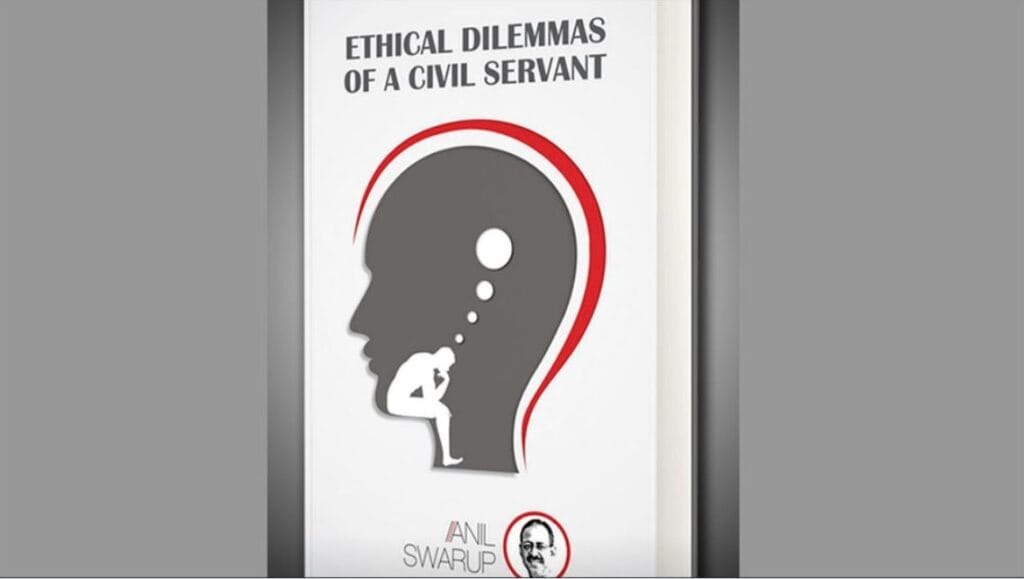
Book Preview: ‘Ethical Dilemmas of a Civil Servant’
To do or not do?
A Journalist by chance and an academician by choice, I made several lifelong friends during my professional journey. As a reporter, I mingled with a cross section of people from the society including many bureaucrats. Watching, interviewing and reporting the dynamics between the politicians and bureaucrats, I found very few who were able to stand their ground.
Once such bureaucrat, Anil Swarup, left a lasting impression and so when he told me about his second book “Ethical Dilemmas of a Civil Servant”, which is being released through online platform on July 5, 2020, I naturally got excited. His first book “Not Just a Civil Servant”, which was released last year was a delightful read as it contained so many interesting anecdotes from his life and even those faced by bureaucrats in general.
A 1981 UP cadre IAS officer, Anil served his state for any years holding several key positions during which he faced several interesting situations that he promised to pen down after retiring. While his first book is already drawing rave reviews, Anil decided to bring out his second labour of love.
I remember him once telling me that civil servants are unsung heroes, a fact he elaborates in the book. An excerpt: ‘A civil servant is like the foundation of a grand building that never gets its due credit despite being the steel frame that holds the structure together. Unfortunately, the only time the common man gets to know about a civil servant is when things have gone wrong, while their good deeds like managing the unprecedented Covid-19 crisis, usually, fail to earn them the recognition that is due. But that is what the civil service is all about…. It is only on some of the rarest of rare occasions when officers like E Sreedharan and KPS Gill may get a chance to grab the limelight’.
Recounting his experiences he writes: “It will not be hyperbolic to state that the ‘good’ are struggling for recognition and a large number of them are fighting their battles against a much more organized set of ‘negativity mongers’. The best lack conviction and the worst are full of passionate intensity!’ The quintessential bureaucrat, if there is one, has been left no option but to change. They have been forced to attempt to come out of their cocoon. And I feel that they should change”.
Another excerpt reads: ‘There is no way they (civil servants) can afford to remain in the ‘ivory tower’; to remain just the silent foundation. They have to make their presence felt. The question is, how?’ He goes on to list some bright bureaucrats who ‘made things happen’ despite serious limitations. Some of them include: Sanjay Agrawal (transformed whichever sector he handled, the turn-round of the Uttar Pradesh Road Transport Corporation being the most significant one); Ajay Bhalla and Vivek Bhardwaj (put in place a transparent and non-reversible regime for coal block auctions); Sutirtha Bhattacharya (Former Chairman, Coal India Limited, whose efforts led to record production of coal in the country); and Ajay Seth, Naresh Gangwar, Nand Kumar, and Sandhya Rani (brought about a transformation in school education in Karnataka, Rajasthan, Maharashtra and Andhra Pradesh respectively).
So what’s the key to encourage officers? An excerpt provides the answer: ‘The key is first to appreciate the good work that they are doing, understand how they are doing it and then try and replicate what they are doing. Civil servants frequently face various dilemmas. There are sacrifices involved and, on many occasions, the choice itself is difficult. And the jury on this is still out!
The book also deals with the issue of bureaucracy being questioned for their ‘credibility’ and goes on to point several institutes being run by them like: The Election Commission, the Comptroller and Auditor General, the Union Public Service Commission and the Central Vigilance Commission that have come under the spotlight from time to time for toeing the line drawn by political masters.
Anil concedes, “It is extremely difficult to insulate institutions from political interference but it is possible to do so due to increasing use of technology and the consequent transparency. The political masters can be induced to make more informed decisions. They can be made aware of the implications of their decisions in a much more aware and transparent world.”
Well, it certainly has whetted my appetite and now looking forward to the release of ‘Ethical Dilemmas of a Civil Servant’.
Congratulations in advance, my friend.
(Anil Swarup has served as Secretary, Ministry of Coal and Secretary, School Education, Government of India. He also served as the head of the Project Monitoring Group (PMG) set up in the Cabinet Secretariat. He is also the founder of ‘Nexus of Good’, which highlights the good work being done by civil servants.)